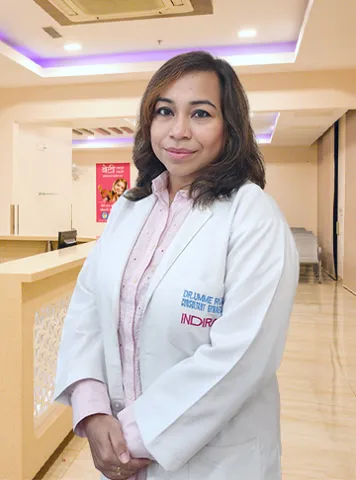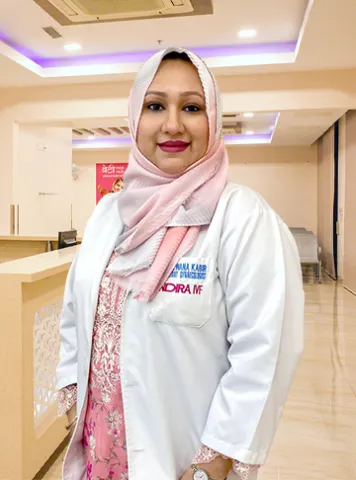Introduction
Infertility is a common reproductive health concern, affecting many women worldwide. Female infertility occurs when a woman is unable to conceive after regular, unprotected sexual intercourse for a certain period: six months if over 35 years of age, and one year if under 35.
Infertility can result from a variety of factors, including age, hormonal imbalances, medical conditions, structural issues, lifestyle choices, and environmental influences. Understanding the types of female infertility Bangladesh is crucial for early diagnosis and effective treatment.
Types of Female Infertility
Female infertility can be broadly classified into primary and secondary infertility
- Primary Infertility: This occurs when a woman has never been able to conceive despite trying for six months (if over 35) or one year (if under 35).
- Secondary Infertility: This type arises when a woman cannot conceive again after previously having at least one successful pregnancy and birth.
Causes of Female Infertility
Female infertility is multifactorial. Its causes can be categorised based on the affected part of the reproductive system.
a. Ovulation Disorders
Ovulation problems are the main cause of infertility, but there’s hope. Regular ovulation is necessary, and ovulation disorders Bangladesh may include:
- Hormonal imbalances: Disrupted communication between the brain and ovaries
- PCOS: Affects many women, causing irregular cycles
- POI: When the ovaries lose eggs earlier than expected
b. Tubal Infertility
Fertilisation usually occurs in the fallopian tubes. Blockages or damage can prevent the egg and sperm from meeting. Common causes of tubal factor infertility Bangladesh are:
- Pelvic inflammatory disease (PID): from untreated STIs
- Endometriosis
- Surgical adhesions
c. Uterine and Cervical Factors
Certain things can stop a fertilised egg from implanting:
- Fibroids: Benign lumps inside the uterus
- Polyps: Tiny growths on the uterine lining
- Cervical issues: Mucus that blocks sperm movement
d. Endometriosis
Endometriosis is a condition in which endometrial tissue develops outside the uterus, affecting reproductive organs such as the ovaries and fallopian tubes. Fertilisation and early embryo development may be impaired, even without visible lesions.
e. Egg Quality and Age-related Infertility
Women are born with a fixed number of eggs. After age 35, eggs decrease in number and quality, which can increase miscarriage and genetic problems. By the time you hit 40, there’s only about a 5% chance of getting pregnant each month.
f. Unexplained Infertility
Not knowing why you can’t conceive can be upsetting. Unexplained infertility affects about 10% of couples, but there are still paths to parenthood.
Diagnosis of Female Infertility
Infertility in women is common and can happen because of hormones, body structure, or age. Finding out the exact cause is important to choose the right treatment.
- Physical and Pelvic Exam: Detects treatable issues early, paving the way for effective fertility treatment.
- Blood Tests: These show hormone balance, helping your doctor guide you toward conception.
- Ultrasound Scans: Detect uterine or ovarian issues such as fibroids, polyps, or cysts that may affect fertility.
- Hysterosalpingogram (HSG): X-ray test that evaluates fallopian tube patency and uterine cavity structure.
- Laparoscopy: A small, safe procedure that looks inside your reproductive organs for problems like endometriosis or scar tissue.
- Semen Analysis: Tests sperm to help understand male fertility and plan for a baby.
Treatment Options
Female infertility is increasingly recognised as a common issue. Hormonal, structural, age-related, and lifestyle factors all contribute. Female infertility treatment Bangladesh which includes early intervention and tailored care, can improve conception rates.
-
Surgery
Surgery can fix structural fertility issues like fibroids, polyps, endometriosis, or blocked tubes. Modern laparoscopic and hysteroscopic techniques reduce recovery time and improve outcomes.
-
Ovulation Induction
Women struggling with ovulation can benefit from hormonal treatments that help eggs mature and be released. Medicines like clomiphene or gonadotropin injections encourage regular ovulation. Monitoring through blood tests and ultrasound keeps you safe and lowers the risk of OHSS.
-
Assisted Reproductive Technologies (ART)
ART includes IVF and ICSI, where eggs are retrieved, fertilised in a lab, and placed back in the uterus. These options give hope when other treatments haven’t worked or if male infertility is involved.
-
Lifestyle Adjustments
Lifestyle modifications, including weight optimisation, abstinence from tobacco and alcohol, stress management, and adherence to a balanced diet, have been shown to improve reproductive outcomes and augment the efficacy of fertility treatments.
Risk Factors for Female Infertility
Female fertility is influenced by a combination of biological, medical, and lifestyle factors. Knowing these risk factors lets women plan better, seek help early, and improve their chances of conceiving.
- Age: Fertility goes down after 30 and more after 35 because egg numbers and quality drop.
- Hormone Issues: Problems like PCOS, thyroid imbalances, or early ovarian failure can make ovulation unpredictable.
- Weight Extremes: Being too heavy or too light can mess with hormones, ovulation, and egg quality.
- Endometriosis: Growth of endometrial tissue outside the uterus can damage reproductive organs and impair fertilisation.
- Structural Abnormalities: Uterine fibroids, ovarian cysts, or blocked fallopian tubes can prevent conception.
- STIs and PID: Infections like chlamydia or gonorrhea can damage your reproductive organs if untreated.
- Past Surgeries or Ectopic Pregnancies: Surgeries or ectopic pregnancies may hurt your fertility.
- Substance Use: Excessive alcohol, smoking, or drug use negatively affects fertility.
Conclusion
There are many reasons why women may face infertility, but getting checked early and starting treatment can really help. Staying proactive with gynaecological care, lifestyle habits, and reproductive awareness helps women take control of their fertility journey. You can meet the top experts at Indira IVF clinic in Bangladesh and find the best solutions for all your infertility problems.
Frequently Asked Questions
How common is female infertility?
What is the difference between primary and secondary infertility?
Can lifestyle changes improve fertility?
What is the most common cause of female infertility?
When should I see a doctor for infertility?
Can age affect egg quality?
What treatments are available for female infertility?
Meet Top Fertility Specialists in Bangladesh at Indira IVF

Dr. Umme Ruman
Chief Infertility Specialist, MBBS(DU), FCPS(Obstetrics and Gynaecology), Fellowship in Assisted reproduction
Dr. Umme Ruman is a BMDC-registered infertility specialist based in Dhaka. She holds advanced qualifications in assisted reproductive techniques, sexual and reproductive medicine. Dr. Ruman serves as a Chief Consultant at Indira IVF Dhaka, helping patients with personalised fertility care based on her vast experience and expertise. Her knowledge and compassion will support couples navigating reproductive health challenges and guide them effectively towards their parenthood dreams.

Dr. Rezwana Kabir
IVF specialist, MBBS (SSMC), MS (Obstetrics and Gynaecology), Fellowship in Assisted reproduction
Dr. Rezwana Kabir is a BMDC-registered specialist in obstetrics and gynaecology, and now a part of Indira IVF’s team of fertility specialists in Bangladesh. She combines medical proficiency with a patient-centric approach, offering tailored solutions to couples seeking fertility assistance. She is committed to helping individuals confidently navigate the journey to parenthood through ethical, empathetic, and evidence-based care.
.


